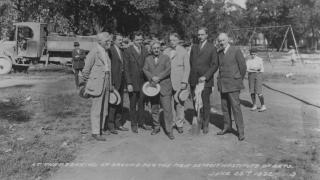
Anyone who knows Geri Pappas knows she’s an imaginative, pedagogy-loving instructor who’s continuously trying out new things to help her students. But the CEHHS lecturer is pretty open about the fact that the quick pivot to remote learning has been a challenge even for her. That’s partly because of the very specific group of students she serves. For years, Pappas has been a chief faculty advocate for one of the smallest and most unique groups studying at UM-Dearborn: international students who are provisionally admitted to their academic programs on the condition that they first complete the university’s English Language Proficiency Program. And perhaps as much as any other, Pappas says it’s a program that thrives on energetic in-person instruction. In a non-pandemic world, that means lots of scribbling on whiteboards, face-to-face conversation, active gesturing to help close gaps in understanding, and good-natured laughter.
“Learning a language is kind of a unique learning experience because communication is essentially both what you’re learning and how you’re learning,” Pappas explains. “And I think students enroll in our program because they have this opportunity to meet other English learners and talk together in a setting where there’s no judgment because everybody is kind of in the same boat. So comradery and togetherness is a huge part of the way learning happens, and I think physically being around each other contributes to that. I’ve heard from several students that not being able to be in the same classroom has felt isolating. And I agree — the energy in our Zoom classroom just isn’t the same.”
Rather than trying to recreate every part of that atmosphere, Pappas has tackled this challenge by doubling down on the kinds of learning experiences that research shows benefit language learners the most. One of her favorite strategies is personalized, project-based work. “The one big thing with ELs [English learners] is you have to have a personal connection to the language you’re learning, otherwise it doesn’t stick,” Pappas says. So for example, when she assigns each student to watch a TED Talk, the particular TED Talk is from his or her academic discipline. Similarly, each student gets to choose the subject of their DIY instructional video (the digital substitute for her usual in-class presentation assignment). This semester, she even worked in a language lesson on the pandemic, so the students could learn obscure words like “placebo.” “Basically, the more relevant I can make the lessons to their lives, the better they learn,” she says.
Pappas says the remote learning environment has also changed her as an instructor, particularly when it comes to exploring new technologies. Blue Canoe, which gives students oral feedback on their pronunciation and intonation, has been one of her favorite discoveries so far. And she’s attended dozens of online workshops to see how colleagues are dealing with similar challenges. She says many of the new tools and strategies are likely to find a place in her course even once she’s able to return to in-person instruction. That is still her preferred format for teaching, but “it definitely won’t be the same course.”





